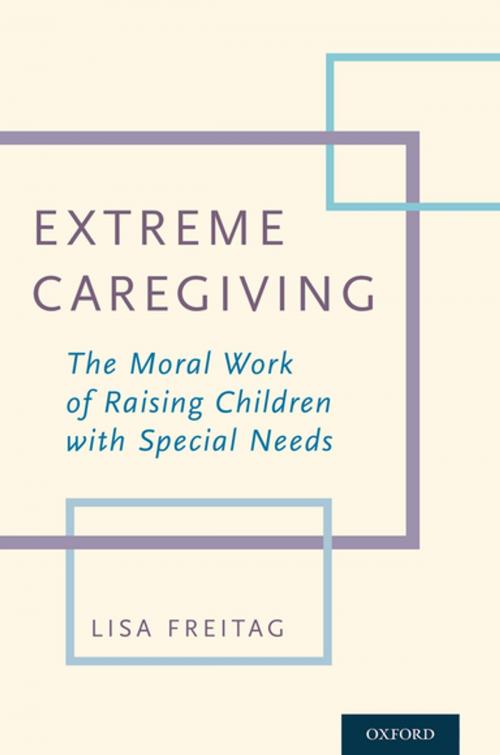Extreme Caregiving
The Moral Work of Raising Children with Special Needs
Nonfiction, Health & Well Being, Medical, Nursing, Pediatric & Neonatal, Specialties, Pediatrics, Reference, Ethics| Author: | Lisa Freitag | ISBN: | 9780190491819 |
| Publisher: | Oxford University Press | Publication: | October 12, 2017 |
| Imprint: | Oxford University Press | Language: | English |
| Author: | Lisa Freitag |
| ISBN: | 9780190491819 |
| Publisher: | Oxford University Press |
| Publication: | October 12, 2017 |
| Imprint: | Oxford University Press |
| Language: | English |
Parents who care for children with special needs, particularly those whose children have multiple disabilities or intellectual delays, are pioneers in home health care and caregiving, yet their experience and expertise are rarely recognized. This book collects parent narratives, personal experience, and academic research to portray the lives of parent caregivers, looking at both the trials and the triumphs inherent in raising a child with special needs. Parents raising children with special needs often must devote all of their resources, both tangible and spiritual, to providing care long into their offspring's lives. Their experience exceeds the usual parameters of parenting. This book examines all of the facets of their parenting role, the care they provide, challenges they face, and questions many assumptions. It presents parents as neither emotional wrecks nor overburdened saints, but as moral individuals struggling to find their own way through relatively unexplored territory. This book begins to recognize the moral consequences of providing long-term care for a child with complex needs. Using a virtue ethic framework isolates the various tasks involved, and evaluates the moral demands placed on the parent attempting to perform them. On their journey to provide for their child the best life possible, parents must alter their own lives and attitudes, and become the sort of person who can perform the necessary caregiving. Raising a child with special needs demands from the parent a reassessment of their personal and social lives. Some of the consequences, such as the presumed emotional and physical burden of constant attentiveness and the numerous unexpected responsibilities, have been reported previously. But the need for competence, which drives an acquisition of medical knowledge, has not previously been analyzed, nor has there been recognition of the enormous moral task of encouraging identity formation in a child with intellectual delays or disabilities. For a child who cannot attain independence, parents must continue to provide care and support into an uncertain future.
Parents who care for children with special needs, particularly those whose children have multiple disabilities or intellectual delays, are pioneers in home health care and caregiving, yet their experience and expertise are rarely recognized. This book collects parent narratives, personal experience, and academic research to portray the lives of parent caregivers, looking at both the trials and the triumphs inherent in raising a child with special needs. Parents raising children with special needs often must devote all of their resources, both tangible and spiritual, to providing care long into their offspring's lives. Their experience exceeds the usual parameters of parenting. This book examines all of the facets of their parenting role, the care they provide, challenges they face, and questions many assumptions. It presents parents as neither emotional wrecks nor overburdened saints, but as moral individuals struggling to find their own way through relatively unexplored territory. This book begins to recognize the moral consequences of providing long-term care for a child with complex needs. Using a virtue ethic framework isolates the various tasks involved, and evaluates the moral demands placed on the parent attempting to perform them. On their journey to provide for their child the best life possible, parents must alter their own lives and attitudes, and become the sort of person who can perform the necessary caregiving. Raising a child with special needs demands from the parent a reassessment of their personal and social lives. Some of the consequences, such as the presumed emotional and physical burden of constant attentiveness and the numerous unexpected responsibilities, have been reported previously. But the need for competence, which drives an acquisition of medical knowledge, has not previously been analyzed, nor has there been recognition of the enormous moral task of encouraging identity formation in a child with intellectual delays or disabilities. For a child who cannot attain independence, parents must continue to provide care and support into an uncertain future.















